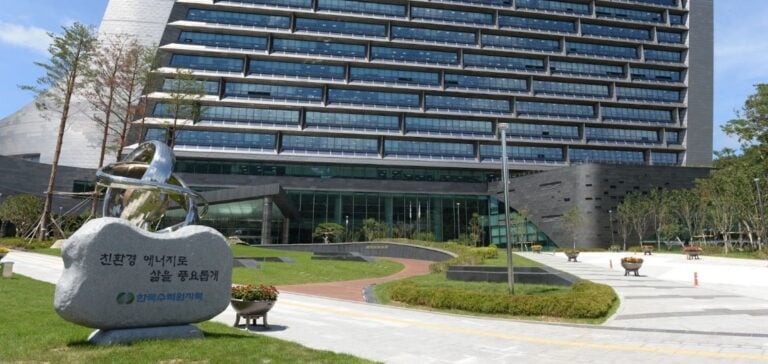Korea Hydro & Nuclear Power (KHNP), South Korea’s leading nuclear energy provider, announced on January 20, 2025, the signing of two memorandums of understanding (MoU) with Scandinavian companies to strengthen its position in Europe. These agreements were signed with Norsk Kjernekraft, based in Norway, and Kärnfull Next, in Sweden, both companies involved in the development of small modular reactors (SMRs).
The first MoU was signed with Norsk Kjernekraft in Oslo, followed by a second signing with Kärnfull Next in Stockholm the next day. These partnerships aim to promote KHNP’s i-SMR technology, a small modular reactor model, in both countries. The agreements include cooperation on the search for potential sites for these facilities, as well as the development of zero-emission smart city models (SMR Smart Net-zero City), which could revolutionize the way these reactors are integrated into local infrastructures.
A New Market Structure for SMRs
KHNP highlights a major shift in the global nuclear energy market, particularly concerning SMRs. Traditionally dominated by nuclear power plant operators, this sector is undergoing a strategic shift, now driven by energy consumers and developers. According to KHNP, this trend reflects a growing desire to diversify the stakeholders involved and respond more directly to local energy needs, while accelerating the transition to safer, cleaner energy.
In Norway and Sweden, local governments are actively supporting the introduction of SMRs, seeing these technologies as a lever to strengthen their energy independence and boost their local economies. Norsk Kjernekraft, for example, plans to build and operate SMR plants in collaboration with energy-intensive industries, following a licensing process that complies with both national and international standards.
SMR Development Projects in Sweden
In Sweden, Kärnfull Next, a subsidiary of Kärnfull Future AB, has been conducting feasibility studies since 2022 to identify the best sites for SMR reactors. The company aims to have its first SMR operational by the early 2030s, as part of an ambitious program to establish several SMR reactor parks. The goal is to achieve economies of scale in technology selection, construction partners, and financing.
The business model developed by Kärnfull Next is based on creating integrated SMR parks, thus optimizing costs throughout the process, from construction to operation. This approach is seen as a response to the economic challenges related to financing such technologies, while ensuring stable and reliable energy production.
The Growing Role of International Partnerships
KHNP, as part of its agreements with the two Scandinavian companies, seeks to increase its presence in the expanding European SMR market. Jonny Hesthammer, CEO of Norsk Kjernekraft, stated that this partnership represents a crucial step for Norway’s energy future, a country historically known for its oil and gas resources. According to Hesthammer, the ambition is to replicate the success of Norway’s energy transition away from fossil fuels, now focusing on reliable, affordable, and clean energy solutions.
SMR projects in Europe, supported by players like KHNP, Kärnfull Next, and Norsk Kjernekraft, illustrate a profound transformation in how nuclear energy could be deployed on a smaller, yet strategically important scale for tomorrow’s energy needs.






















